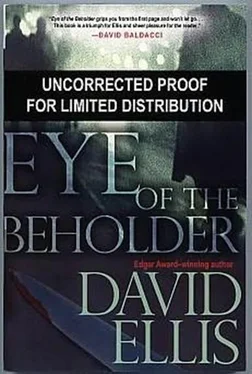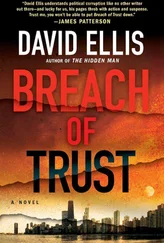Harland bristles at my advice. Men in his position don’t like being told they are without options. “I want it to stop, Paul. Homaro!” he calls to a man dressed in all white, presumably the chef, who delivers the appetizer-some deep-fried meatballs that smell delicious. They exchange pleasantries, speaking in Japanese, and then the chef leaves the table.
“I want it to stop,” he repeats to me as he helps himself to the appetizer. He sticks the tiny fork into the meatball with a bit too much enthusiasm.
IN THAT SNAP of a moment after Evelyn Pendry’s shoulders jerk violently, Leo bursts out. This isn’t the time, not the time-
You see me.
– but there’s no choice, and he still has the element of surprise. He rushes toward her, but she has the angle on him and breaks for the living room. He goes low and catches her ankle. She falls to the carpet.
Keep. Her. Quiet.
Leo twists her ankle sharply, feeling the snap. She trades terror for pain, crying out but in reaction, not alarm. He comes down on her, pressing the knife against her face. She freezes, breathing rapidly but not making a sound. She’s calculating, yes, calculating, thinking it through, she knows the knife is close enough to end this right now. If she cries out-if she tries to warn them-it’s over.
He grips her silky blond hair, savors it a moment, then yanks it. She understands. He turns her over so she is on her back, facing him. He puts his knees on her arms and presses the knife against her throat.
She smells like strawberries.
MIKE McDERMOTT leans against the wall in the living room, watching Grace read to her grandmother. He does that a lot these days, silently watches his seven-year-old daughter, marveling at how a man who handles violent criminals and visits horrific crime scenes can be laid so bare, so utterly vulnerable and terrified by this small little lady.
She is an excellent reader, the word her teacher used. She has her mother’s intelligence, her critical reasoning and verbal skills. And her behavior has improved this year. Fewer outbursts. Socializing more.
Year Four, is how he thinks of it. He doesn’t measure her from birth but from Joyce’s death. She still has the dreams, still asks the unanswerable questions. But Dr. Sutton says there’s no indication of early-onset. Only a third of the children, at most, inherit their parents’ bipolar disorder, he said-meaning about seventy percent don’t. McDermott confronted him with the literature- early-onset can consist solely of depression that evolves into bipolar -but the doctor says she’s a functional little girl who’s finding her way through this.
She blames herself, the doctor had said, words that filled McDermott’s throat. That’s not unusual. It was her mother, after all.
McDermott remembers staring at his shoes at that comment, unable to find words.
So he watches Grace every day, the highs and the lows, looking for the warning signs. Every time she argues or cries or has a tantrum or jumps for joy, he makes a mental note. He was even keeping a journal for a while. Laughed at a cartoon. Complained about her cereal.
‘“Matt,”’ Grace reads in a narrative voice, “‘who had seen guests come and go for many years, knew there were two kinds…”’
Mike’s mother, Audrey McDermott, is on the floor with Grace, gathering her granddaughter in her arms and reading along with Grace over her shoulder. The sight of it almost moves McDermott to tears.
The phone rings. They look up but McDermott raises a hand. He gets it on the second ring, and, after listening, mouths the word Shit.
McDERMOTT MAKES IT TO the apartment building by nine, pulling up behind a squad car, one of six parked along the curbside, lights flashing. There are news trucks and camera crews and reporters in makeup positioning themselves and scribbling notes and checking the artificial lighting. One of them is angling herself by the apartment building, asking her cameraman to evaluate the position.
The building is on the near north side, four stories high, with a courtyard in the middle. Looks like a series of condos, pricey, given the neighborhood, but presumably very small. Evelyn Pendry probably didn’t earn much as a staff reporter for the Watch.
He takes a wide, inner staircase of concrete steps. There are CAT officers on the stairs, dusting the handrails for prints, though it’s a community staircase full of hundreds of useless finger- and shoe prints. The killer wouldn’t need to touch the handrail, and probably wouldn’t be stupid enough.
On the third floor, the CAT unit is again at work, brushing for prints and searching outside the apartment in the hallway with paper evidence bags, but they seem to be doing it as an afterthought, as if their work is nearly done. McDermott looks down in the courtyard, where a number of the residents are huddled, looking upward and gossiping about the woman who was murdered. Some of them probably knew Evelyn Pendry.
Ricki Stoletti, in a dark jacket and jeans, emerges from the apartment. She gives some instructions to the uniforms and then looks down the hallway. She nods at McDermott as another woman walks out, someone he recognizes. Perfectly tossed blond hair, expensive suit.
Oh, of course. The victim’s mother, Carolyn Pendry. The news anchor.
Stoletti does an intro. “Detective Mike McDermott, Carolyn Pendry.”
“Mrs. Pendry, I’m so sorry.”
Carolyn Pendry is the reason McDermott is here. The call came from the commander himself. She is probably the most prominent newsperson in town, and when her child is murdered she gets the top-ranking detective in Area Four.
He does the preliminary talk quickly, because he wants to go in.
“I’m coming with you,” she tells him.
“Well, Mrs. Pendry-”
Kid gloves, the commander said. She gets what she wants.
“It would be better if you-”
“I’ve already seen her. I want to know what you think.”
McDermott looks at Stoletti, who gives him a You’re the boss, don’t look at me.
“Okay,” he relents. “Let’s go.”
AFTER DINNER WITH HARLAND, I should be in a foul mood. Harland wants me to figure out a “diplomatic” way to shut off Evelyn Pendry’s inquisition, which leaves me with an impossible task. But I’m not in such a bad mood. Correction: I’m flying since my rendezvous with Shelly today. I hate like hell that I’ve surrendered that much of myself, but, what the hell, I’m a tall drink of water, there’s a lot of me to go around.
I pick up Shelly on my way home. Our conversation is civil-How was your day? Fine, how was yours?-though I’m bursting at the seams.
I strip off her clothes before she’s taken two steps into the foyer. I think of the staircase, but there’s no carpet, so I carry her into the adjoining room and get busy. I’m still the scrappy basketball player at heart. What I lacked in talent I made up for in hustle, dove for the loose ball, took the charge. I apply the same can-do spirit in the bedroom, or, in this case, the living room, or parlor, or whatever this room is. I may not score a triple-double, but she’ll know I gave her the full Riley effort.
And it’s different this time, compared to this afternoon. She doesn’t hold back, pressing her tongue into my mouth violently and gripping my neck and wrapping her legs around my waist.
We need to break up more often.
“Now, that,” I manage, “was nice.”
I collapse on her, feeling her heart pounding, her breath on my neck. I inhale the wonderfully fruity smell of her hair, which is not difficult because my nose is buried in it. Calling this moment nice is like calling skydiving interesting.
Читать дальше












